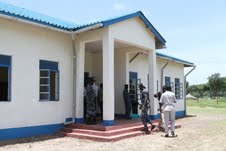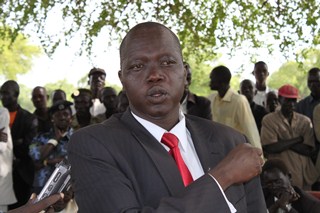Lakes State gets new customary law centre
September 8, 2012 (JUBA/RUMBEK) – A new national customary law centre, under South Sudan’s Ministry of Justice, was on Thursday officially inaugurated in Rumbek, the provincial capital of Lakes state.

The centre was established with support from United Nations Development Programme (UNDP) and funded by the Canadian government through its Department of Foreign Affairs and International Trade (DFAIT).
Lakes State Deputy Governor, Mabor Achol Kuer, while speaking at the event said he appreciated the support of both bodies in order to improve the rule of law in the state.
In South Sudan, customary courts, often referred to as “chiefs’ courts,” are responsible for adjudicating the overwhelming majority of civil and criminal cases.
In 2005 South Sudanese rebels signed a peace deal with the Islamist government in Khartoum, which accorded the region a high degree of autonomy including its own secular constitution. South Sudan’s Interim Constitution (ICSS) identified customary law both as law and a “source of legislation”.
The interim period of the Comprehensive Peace Agreement ended last year when on 9 July South Sudan declared its independence signing into being a new Transitional Constitution, which also gives strong prominence to customary law.
“Customary law can affect our lives in the way we conduct transactions. [But] for a customary law to be fair, it must be consistent [and] it must be just,” said Paulino Wanawila Onango, South Sudan’s Deputy Minister of Justice.
Onango, however, called for the demonstrable need for a comprehensive reform of the legal framework governing customary law in South Sudan.
Toby Lanzer, the UNDP Resident Representative highlighted the challenges of reforming laws in South Sudan as the justice system must reflect the culture and values, which is difficult in a country which has a many diverse cultures as South Sudan.

“We must recognize the importance of customary law in South Sudan and reforming it will have to be done in a conflict sensitive manner,” said Lanzer, who also doubles as South Sudan’s humanitarian coordinator.
Meanwhile, Catherine Fleming, the head of stabilization at the Canadian Embassy in Juba said the new customary law facility will also provide an important opportunity to capture the rich and varied cultures of the numerous South Sudanese ethnic groups, ensuring its history is available to future generations.
A recent report on the state of prisons in South Sudan by Human Rights Watch (HRW), cites a contraction between customary laws and the statutory ones, especially in the administration of justice to alleged victim in South Sudan.
However, while speaking at the same event, the Chairperson of South Sudan’s Law Reform and Constitutional Review Commission (CRC), Prof. Akolda Maan Tier, said customary laws play large roles among the people of South Sudan, especially in matters of marriage and property.
“However, lines between the customary and statutory courts of first instance are often blurred both as a matter of law and practice. At the same time, there is varied understanding amongst both statutory and customary actors on the distinctions between the two bodies of law,” said Prof. Tier.
The CRC Chairperson also expressed concerns over what he described as the insufficient capacity to administer and oversee the functioning of customary courts, in line with the constitution and existing laws of South Sudan.

The law facility, state officials told Sudan Tribune, will also provide advice and training for all branches of government on matters related to customary law and serve as a repository for all relevant customary law research and reference materials.
The centre, according to the Deputy Chairperson of the Local Government Board, Anthony Ariki Lowly, is expected to work closely with the board in reforming customary law while ensuring it complements the statutory legal system.
“It will be our duty at the Local Government Board to collaborate with the Ministry of Justice to ensure cultural traditions are honoured and upheld; and the customary courts uphold justice for the citizens and communities,” he remarked.
(ST)
